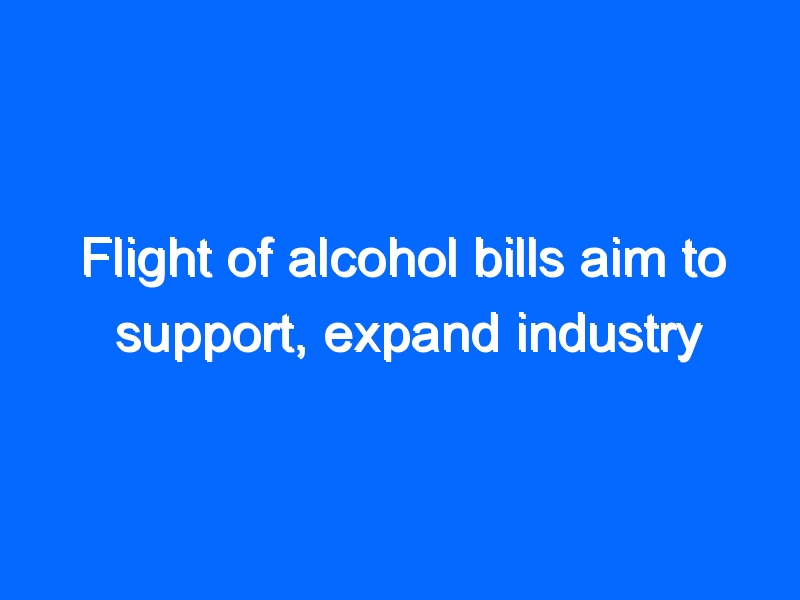

DOVER — State lawmakers are weighing a flight of bills aimed at liquor stores and craft breweries while another continues a lifeline that many taprooms and restaurants have relied upon to stay in business amid the pandemic.
Both liquor stores and craft breweries in Delaware are capped by the number of licenses they can hold, but two bills would raise those ceilings to allow for more growth in the alcohol industry. House Bill 23 would raise the number of liquor stores one individual or business can have in the state from two to three, while House Bill 45 would raise the cap for breweries and brewpubs to three to five.
Rep. Bryan Shupe (R-Milford), one of the sponsors of HB45, argued that capping the alcohol industry was an anti-business measure that hampers one of Delaware’s best sectors. Shupe has been a part of recent efforts to eliminate the cap entirely, but in the last two years bills have either died in committee or never made it to the Senate floor.
“It was very divisive back then, particularly on the distribution side,” Shupe told the Delaware Business Times. “Breweries and brewpubs are a small business, and as a small business owner myself, I hate to see anyone limit a small business. They already face a lot of challenges in terms of attracting an audience and working through the regulations even before they even start talking about expansion.”
Delaware’s three-tier distribution system requires producers — like breweries and wineries — to sell its product to wholesalers, who in turn sell it to retailers. The system is intended to serve as quality control to consumers, but it also created an industry of its own. The six largest distributors in Delaware employ 414 people, handle a payroll of more than $40 million, pay nearly $37.7 million in federal, state and local taxes, and are responsible for $208.7 million in total economic impact, according to a 2017 University of Delaware study.
“There’s some fear that will cut into the distribution side and other taxes. But there’s also the reality that breweries and brewpubs have exploded. With the cap, they’re limited in how much they can expand, so they’re turning to other states,” Shupe said.
Delaware breweries contributed $430 million to the state’s economy in 2019 and produced 317,328 barrels of beer, according to the national Brewers Association. Lauren Bigelow, the marketing director for the Delaware Brewers Guild, cautioned that impact may plateau, however, as breweries are forced to look out-of-state for expansion under the state cap.
“Crooked Hammock already has two locations, and instead of putting their third location in Delaware, they went to Myrtle Beach, S.C. There’s others considering expansion right now, but they’re in a bind,” Bigelow said. “It really limits the job and economic growth in this state, and we believe there is certainly room to grow in Delaware.”about:blank
Iron Hill is the most famous example of the cap forcing breweries to beyond the First State. Plans to expand to the former Don Pablo’s restaurant near the Christiana Mall were scuttled after learning about the cap, and the brewery moved production and 100 jobs to Exton, Pa.
When asked whether removal of the cap would entice Iron Hill to add more locations in Delaware, Iron Hill Chief of Operations Joe Kopke said the group is “always open to opportunities.” “If the cap were to be increased, given our loyal fan base in Delaware, we could explore bringing our new, polished fast casual concept, Iron Hill Brewery TapHouse, or opening additional brewery and restaurant locations in our home state,” Kopke told Delaware Business Times.
Another bill filed this year would grant Delaware breweries and microbreweries the ability to brew, bottle and sell their own hard seltzers. Although federal law has allowed brewing of hard seltzer for years, the state law has yet to catch up. Hard seltzers have skyrocketed in popularity for those looking for a low-calorie option without losing flavor.
Wilmington Brew Works tested a seltzer in late 2019, and other independent breweries like Midnight Oil are testing out their own this year. Bigelow said that while breweries are starting to sell seltzer, it’s not a “true” seltzer but made with barley. Seltzer is essentially boiling sugar and adding flavor to it.
“Because there’s nothing in the code about this, that’s how some breweries are getting around this,” she said. “This is just a natural fit for breweries, because they can use the same processes. It’s another product breweries can offer, especially in the case when someone comes in with a friend who may not like the taste of beer.”
Finally, House Bill 1 would continue alcohol to-go sales for restaurants and breweries until March 2022. During the 2020 session, the General Assembly allowed to-go alcohol sales as a way to help tide over the hospitality industry while indoor seating was still limited. That measure is set to expire this March.
Delaware restaurants lost more than $1 billion in sales in 2020, according to the Delaware Restaurant Association. Between February and April 2020, Delaware lost 66% of its food or drink establishment jobs, one of the highest rates in the nation.
The Delaware House passed HB 1 on Jan. 27, and Shupe has a positive outlook on the remaining alcohol bills, including HB 45. “It looks like people are coming to the table on this, and there’s some encouraging movement,” he said.


